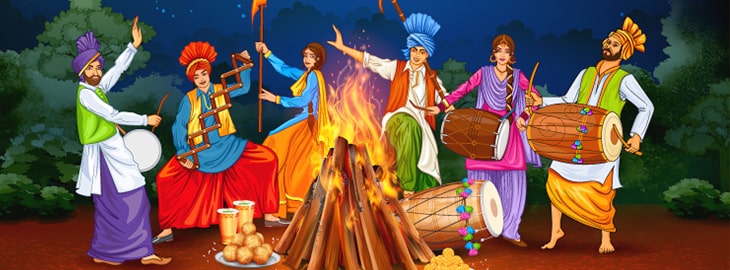The festival of Lohri is meant to be celebrated on winter solstice. On the day after Lohri, day light is meant to rise people believe that it brings a pleasant morning of hope. It is a harvest festival which is fervently celebrated by Sikhs. It is mainly the festival of and Haryana. The celebrations of Lohri start early in the morning and people wish each other with great enthusiasm and Punjab. Let’s know more about this festival.
Main aim of celebrating Lohri
The festival of Lohri is also linked with Bikrami calendar and is connect with Makar Sankranti which is celebrated in the Punjab region as Maghi Sangrand. Lohri is celebrated to memorialize the passing of the winter solstice. This festival is celebrated to welcome the new Economic year of farmers in peace with Bikrami Calendar. New agricultural tenancies are about to start on Lohri and rents are collected on this day, that is why, it is celebrated as new economic year.
Ceremony
Lohri is the most famous festival of Punjab and Haryana but it is now widely celebrated by Hindus too. This festival is now celebrated at a large scale among the different areas and region of our country that everyone celebrates it with great joy and prompting. Lohri is just like a thankful festival as the farmers on Lohri shows their gratefulness to the almighty for good abundance and rich harvest.
- During the day, children go from door to door singing folk songs and are given sweets and savories and sometimes money.
- Turning children back empty-handed is regarded as inauspicious. The collection consists of til, jaggery, Gajak, crystal sugar, peanuts and popcorn.
- The collections conjunct by children is known as Lohri which is distributed among all the people at night.
- People light the bonfire and then the Lohri distributed among people is thrown into bonfire along with some other food items like jaggery, peanuts etc. They all enjoy the Lohri night by sitting and singing Lohri songs together.
- The Lohri night ends up by having a traditional feast of (sarson da saag, makki di roti and kheer).
- On this Lohri day, kite flying is also popular in some parts of Punjab.
Lohri songs and its significance
Lohri songs play a significant role in the celebration of the occasion as these songs represent the joyfulness and excitement filled up inside a person. These songs are being enjoyed by each and every person celebrating Lohri. Singing and dancing form and significant part of the festivity. These songs are like traditional folk songs which are sung to thank god for rich harvest and good profusion. The Lohri songs are also sung to honor the Punjabi warrior Dulla Bhatti. People wear their brightest clothes and come to dance Gidda and Bhangra on the beats of the Dhol. The program of dancing over the beat of Dhol is carried out around the bonfire.
Dulla Bhatti
Over time, people correlated Lohri to the tale of Dulla Bhatti. The central character of many Lohri songs is Dulla Bhatti, who lived in Punjab during the tenure of Mughal Emperor Akbar. In order to pay tribute, many people also mention the Robin Hood of Punjab - Dulla Bhatti. Not only he robbed the rich, but also rescued poor Punjabi girls who were forcibly taken to be sold in slave market. Amongst them, there were two girls Mundri and Sundri who deliberately became theme of Punjab folklore. So, Lohri songs are sung to owe respect to him for the services he had render during his lifetime.
Lohri in other parts of India
In Andhra Pradesh, the day before Makar Sankranti is known as Bhogi. On this day, all the old and derelict things are discarded and new things causing changes or transformation are brought in focus. At dawn, bonfire is enlightened with logs of wood, other solid-fuels and wooden furniture at home that are useless. Only the materialistic things are not disposed off, along with these things, all evil habits and evil thoughts are to be sacrifice in sacrificial fire of the knowledge of Rudra, known as the Rudra Gita Gyan Yagya. It represents purification and transformation of soul by guzzling and inculcating divine virtues.



